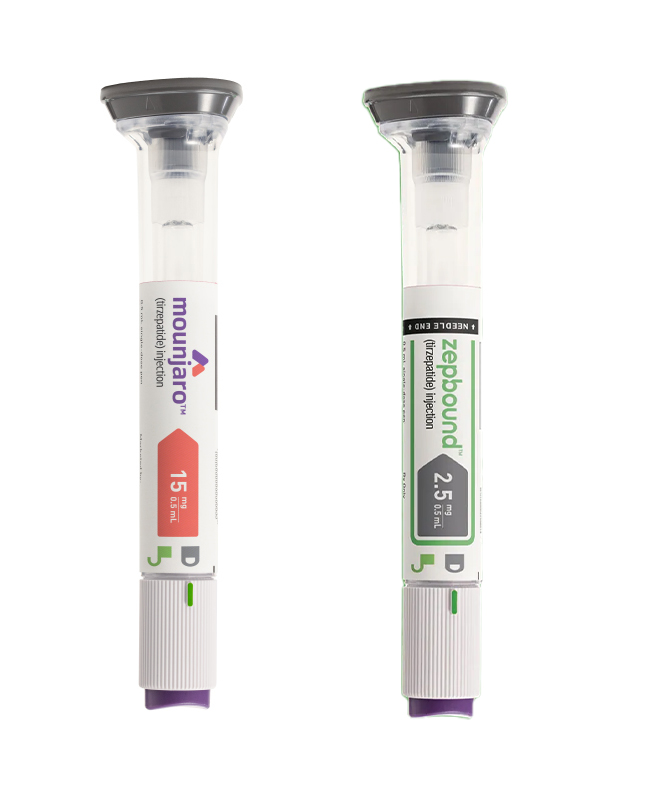Medication Management
Prescription Weight Loss Medications
Mounjaro/Zepbound
(Tirzepatide)

Mounjaro/Zepbound (tirzepatide) is a prescription medication approved by the FDA for the treatment of type-2 diabetes. Eli Lilly, the pharmaceutical company that has developed tirzepatide, anticipates that in late 2023 the FDA will also approve use of Mounjaro/Zepbound as a weight loss medication in patients with obesity.
Mounjaro/Zepbound belongs to the same class of drugs known as glucagon-like peptide-1 (GLP-1) agonists as other weight loss drugs Wegovy (semaglutide) and Saxenda (liraglutide). However, Mounjaro/Zepbound also acts as an agonist for glucose-dependent insulinotropic polypeptide (GIP), which can provide additional benefits for weight loss and blood sugar control.
Mounjaro/Zepbound is effective as a weight loss medication by suppressing appetite. It is injected once a week under the skin (subcutaneously) of the stomach (abdomen), thigh, or upper arm.
As with all weight loss drugs, Mounjaro should always be used as part of a weight loss program that includes a healthy reduced-calorie diet, exercise, and behavior change. This medication is intended for people who are significantly overweight or obese, and who have not been able to lose weight through diet and exercise alone.

How does Mounjaro/Zepbound work for weight loss?
Mounjaro/Zepbound and the other GLP-1 agonists work by slowing the rate food passes through the digestive system, which increases the sensation of fullness. In addition, GLP-1 agonists work in the brain to decrease hunger. The end result is that Mounjaro/Zepbound and other GLP-1 agonists make it easier to follow a reduced-calorie diet. These medications do not make you “burn calories” or enable you to “lose weight without dieting.”

What are the health benefits of Mounjaro/Zepbound?
Mounjaro/Zepbound can help people with obesity first lose weight and then help with the second critical step of maintaining that healthier weight. Doing so has many health benefits.
The health risks accompanying obesity are generally well known, and include heart disease, high blood pressure, type 2 diabetes, stroke, certain types of cancer, and a shortened life span. In pre-menopausal women, obesity is also associated with polycystic ovary syndrome (PCOS), a condition characterized by hormonal changes resulting in irregular menses, difficulty getting pregnant, and excess body hair.
Losing weight can prevent, treat, and in some cases, even reverse obesity-related health conditions. A patient does not have to become “slender” to benefit from weight loss; just 5-10% (10-20 lbs in a 200 lb person) can result in very significant health improvements, including lowering blood pressure, lipids, blood glucose, and hemoglobin A1c. There can also be physical benefits (more energy, better mobility, diminished joint pains) and mental/emotional benefits such as reduced stress and anxiety and increased confidence and self-esteem.
What are the clinical trial weight loss results for Mounjaro/Zepbound?
In a phase 3 clinical trial called SURMOUNT-2, 938 obese or overweight adults with type-2 diabetes were assigned to one of three groups: a placebo, 10 mg of Mounjaro/Zepbound, or 15 mg of Mounjaro/Zepbound. Each patient in one of the two experimental groups began with 2.5 mg of Mounjaro once a week. The dose was increased by 2.5 mg every four weeks until reaching the appropriate amount.
The 10 mg Mounjaro/Zepbound group experienced an average weight reduction of 13.4% or 29.8 lbs, which was over four times more weight loss than the placebo group. Almost 80% of patients taking the 10 mg dose had lost 5% or more body weight, and over 40% achieved a 15% or more body weight reduction. Weight loss in the 15 mg group was slightly better, with over half losing at least 15% body weight. ¹
It is important to note that these impressive amounts of weight loss occurred over 72 weeks of treatment. Keep this in mind when you read about some miracle treatment that claims huge amounts of weight loss in a very short time.
What are the potential side effects of Mounjaro/Zepbound?
Like all medications, Mounjaro has potential side effects. The most common side effects include:
- Nausea
- Diarrhea
- Decreased appetite
- Vomiting
- Constipation
- Indigestion
- Stomach pain
Other less common but potentially serious side effects include:
- Increased heart rate or blood pressure
- Allergic reaction
- Severe pain in the stomach (possible sign of inflammation of the pancreas)
- Low blood sugar
- Changes in vision
- Gallbladder problems (that can result in yellowing of the skin or pain in the upper stomach region).
As these side effects may not be all the possible side effects of Mounjaro, be sure to talk to your healthcare provider about any symptoms that develop while on Mounjaro/Zepbound that bother you or do not go away.
Before starting any prescription medication, it is very important to talk with your healthcare provider about your medical history and the potential risks and benefits of the medication. After starting Mounjaro/Zepbound, it is important to remain under the supervision of a qualified healthcare provider since adjustments of the dose are often needed. In addition, your provider can help to address any potential side effects and assess your progress in the weight loss program.
Am I a good candidate for Mounjaro/Zepbound?
You may be a good candidate for Mounjaro if you have:
- Body mass index (BMI) over 30
- BMI over 27, plus a weight-related health condition such as high blood pressure, diabetes, or elevated lipids.
- Due to lack of data on safety in pregnant humans, women who are pregnant or planning to become pregnant should not take a GLP-1 agonist.
How is Mounjaro/Zepbound taken?
- Mounjaro/Zepbound is injected under the skin (subcutaneously) of your stomach (abdomen), thigh, or upper arm.
- Mounjaro/Zepbound is used 1 time each week, at any time of the day.
- Never mix insulin (if you are diabetic) and Mounjaro/Zepbound together in the same injection.
- You may give an injection of Mounjaro/Zepbound and insulin in the same body area (such as your stomach area), but not right next to each other.
- Rotate your injection site with each weekly injection.
- If you accidentally take too much Mounjaro/Zepbound, call your healthcare provider or seek medical advice promptly.

What happens if I stop taking Mounjaro/Zepbound?
Unfortunately, most people who lose weight regain much or all of the weight that they lost. On the one hand, this should be expected if after losing weight someone stops everything they did to lose weight and returns to doing everything exactly as they did while gaining weight.
However, making very important lifestyle changes like eating a healthy diet and getting more physically active often are not enough to prevent regaining weight. The reason for this is that when you have obesity, the regulation of your body weight is dysfunctional. Your body will try to push you back to your previous weight. In this situation, Mounjaro, or some other long-term weight loss medication, maybe a necessary part of the care plan needed to keep your weight in a healthier place.
It is as important to work with your health care provider after a weight loss program as it is during the weight loss program!
Mounjaro/Zepbound (tirzepatide) vs. Wegovy (semaglutide) vs. Saxenda (liraglutide): how are they different?
Mounjaro/Zepbound, Wegovy, and Saxenda have many more similarities than differences. Important similarities include that all three have proven to be effective additions to weight loss programs. All three are also expensive, and the cost may not be covered by your insurance.
However, there are some differences. Mounjaro/Zepbound (tirzepatide) acts on both GIP and GLP-1 receptors, while Wegovy (semaglutide) and Saxenda (liraglutide) act only on GLP-1 receptors. Therefore, Mounjaro/Zepbound is a dual-acting receptor agonist.
All three medications are taken by subcutaneous injection, but Mounjaro/Zepbound and Wegovy are taken weekly; Saxenda is taken daily.
Your healthcare provider will discuss with you which of these, or some other weight loss medication, might be right for you.
Footnote:
1.Pharmanews Intelligence: https://pharmanewsintel.com/news/lilly-announces-mounjaros-weight-loss-success-in-recent-clinical-trial
Sources:
Mayo Clinic: https://www.mayoclinic.org/drugs-supplements/tirzepatide-subcutaneous-route/proper-use/drg-20534045
Scientific American: https://www.scientificamerican.com/article/breakthrough-obesity-drugs-are-effective-but-raise-questions/
Cleveland Clinic: https://my.clevelandclinic.org/health/drugs/23789-tirzepatide-injection
Are you ready to start down the path to a healthier you?
Prevent, reverse, or manage a chronic disease?
Take control of your health today. Better health IS within your reach.
Take the first step today. Call us today @ (919)354-7077
Take The Stress Out Of Prior Authorizations
We will work with you, your insurance company, and pharmacy to get your medication needs met.

